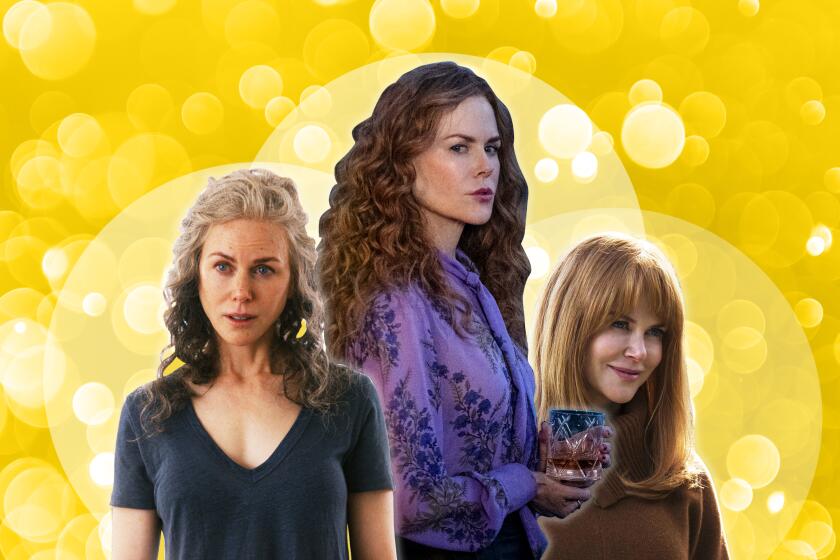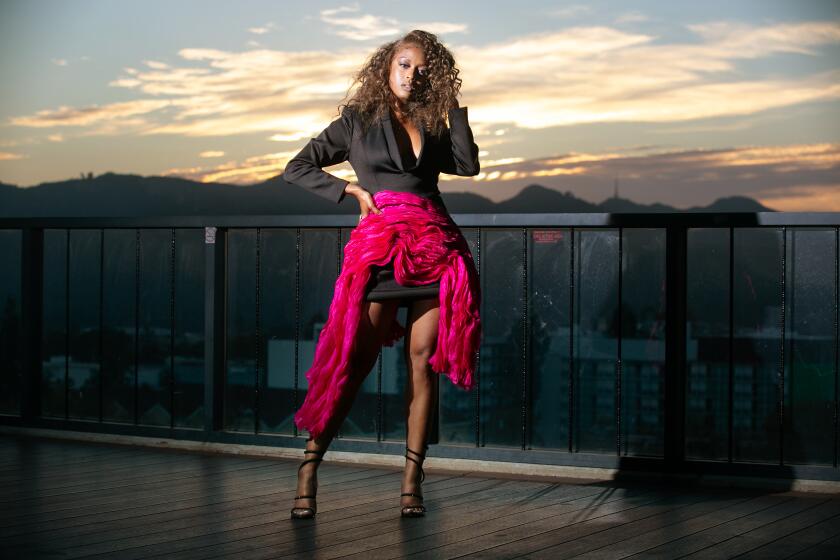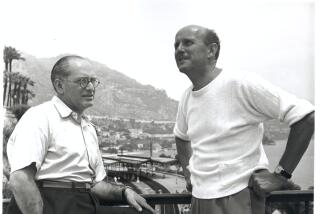New York City, over? Fran Lebowitz and Martin Scorsese say it’s ‘out of the question’
- Share via
Martin Scorsese and Fran Lebowitz are trying to remember how they met. Scorsese ventures that it was at a literary party on New York City’s Upper East Side with “Goodfellas” screenwriter Nick Pileggi, but Lebowitz shoots this idea down: “That wouldn’t have been me.” Could it have been John Waters’ 50th birthday party? She doesn’t think so: “That was only, like, 25 years ago.”
“We both believe it was at a party,” says Lebowitz, the author and professional speaker, in a video conference with the Oscar-winning director. “Because where else would it have been?”
Few living people are more identified with New York than Lebowitz, who made her name as an Interview magazine columnist in the 1970s and has since morphed into a kind of professional Manhattanite, and Scorsese, who was raised on the Lower East Side before making films such as “Taxi Driver” that have powerfully shaped perceptions of the city in the popular imagination.
Their friendship may have murky origins, but it has been productive: In 2010, Scorsese directed “Public Speaking,” an HBO documentary highlighting Lebowitz’s wry commentary on urban culture. Now they have teamed up again for the Netflix series “Pretend It’s a City,” which premiered Friday. Each episode, loosely organized around a theme — money, transportation, health, books — features Lebowitz riffing sardonically on subjects from Leonardo DiCaprio’s e-cigarettes to the #MeToo movement. Filmed before the COVID-19 pandemic hit New York City, it includes much grumbling about former Mayor Mike Bloomberg and the sanitization of places like Times Square, but it’s also a poignant snapshot of the city, however flawed, before its latest crisis.
Scorsese, who directed the seven episodes, is a generous audience to Lebowitz, laughing enthusiastically at her quips in conversations filmed at the Players Club.
The dynamic was similar during their conversation with The Times as Scorsese, in his book-lined home office uptown, let Lebowitz, dialing in from a generic conference room at Netflix’s offices downtown, take the lead.
A committed Luddite, Lebowitz doesn’t have a computer, a cellphone, an internet connection or, indeed, a Netflix subscription. “I have asked many people, ‘Do you have Netflix?’,” says the writer, wearing one of her trademark blazers. “And it’s like I’m asking them, ‘Do you have electricity?’”
Before making “Pretend It’s a City,” Lebowitz and Scorsese agreed on two things: They wouldn’t film in the summer (too hot) and they’d minimize travel out of Manhattan (too much traffic). For scenes at the panorama of New York City at the Queens Museum — a miniature replica of the city’s skyline — they made a rare exception.
“This was approached as if we were going to Afghanistan,” Lebowitz says.
The Times TV team selects the 15 shows we’ll be watching when they premiere or return in 2021.
How did you decide to make another documentary after “Public Speaking”?
Scorsese: I loved the movie, and I loved making the movie. Every time I was editing the film, I still had the same reaction each time, to every story, every line. All the inflections, the tone, the dialogue, the music. I became very entranced by the form of it. I said, “Well, why don’t we do this again? It’d be great to have a running commentary every week, so to speak.” We tried a couple of things. Fran, you came up with the idea, ultimately, of the title and what it means.
Lebowitz: “Pretend It’s a City” came about because this — as you surely noticed — was all shot before COVID. The title was something I had been yelling at people in the street for, like, 15 years. And when I say people, I mean tourists. People who stand in the middle of the sidewalk, chatting or taking pictures of each other, and impeding the flow of traffic. I was prone to yelling at people, “Move! Pretend it’s a city, not your living room.” So now, of course, because of the virus, people think: “Oh, that’s such a poetic title [in a wistful tone]: Pretend It’s a City. But it doesn’t mean that. It means [aggressively] “Move! Pretend It’s a City!”You have both lived through numerous difficult periods in the history of the city. How do you think the pandemic has changed it?
Lebowitz: Of course, it’s completely changed. But “change” is probably not the right way to put it, because change implies “and now it’s this.” It’s in flux. It’s not gonna stay the way it is now, because the way it is now is different than it was last week and certainly different than it was the beginning of shutdown. If I could see the future, I wouldn’t buy the wrong lottery tickets every week. The one thing I know for sure, this idea New York is over, is just —
Scorsese: Out of the question.
Lebowitz: It’s moronic. Anyone who thinks that, anyone who left because they thought that: Goodbye. There’s no one who has ever been less needed in New York than someone who would do that. It is so dopey. People who say New York is not going to be the center of the culture anymore, I would say, “Really, where do you think it will be? Do you think it’s gonna be Sarasota? Omaha? Honey, it’s gonna be here.”
By the way, not everything was perfect before the virus. It was perfect from the point of view of no fatal virus. That was definitely much better. But there might be things that improve.
Scorsese: I come from the Lower East Side. Elizabeth Street, just between Houston and Prince off of the Bowery. And back in 1950, you couldn’t tell me that those buildings would still be there 70 years later, and the neighborhood would become rather chic. My building that I lived in is still there. The fact is that the buildings were not destroyed, which was the usual thing that was happening in Manhattan at the time — the Metropolitan Opera, Pennsylvania Station — but they stayed.
That’s how the city regenerates like a phoenix and creates some different pockets of life and art and culture. The same way in Los Angeles too, really. I was there in the ’70s. It was very different. [In “Mean Streets”] I was able to shoot some of the main streets for downtown L.A., for downtown New York. It’s natural for the city to resurrect itself constantly.
Since “Big Little Lies,” the Oscar winner has brought prestige to a medium eager for it — and inspired a wave of stories about affluent women on the verge.
How have your daily work routines been disrupted?
Lebowitz: You have to be a lot more hardworking and organized than I am to have your daily patterns disrupted. What was disrupted were my nightly patterns.
Unlike Marty, I live by myself. If I had to go through this with someone else in the apartment, that someone would be killed. The people I know who don’t live by themselves, I think, “How can you bear it?” Even if they’re living with other people that I like, I think, “Well, I like them. But are you kidding me? You’re stuck in an apartment with them?”
I realized at the very beginning that I was waiting for it to end, you know ? By the ninth day, “Is this over yet? No? Come on. End this, it’s too long.” At a certain point, I just accepted it. I tell myself, “Fran, you’re not in a refugee camp.” That’s true. I’m not. But it still means that I can’t go to a restaurant and that most of the things that make up my life in New York are gone. But they’re not forgotten. And they’re not gone for good.
There was a period where walking around was so heartbreaking, because you were seeing these refrigerated morgues in front of hospitals all over New York. The sight of those things was so horrible and now you don’t see them. That period was so different that it seems like it might have been like 10 years ago.
Ever since the holidays, when I watch the news, I see the airports packed with people saying, “Well, I haven’t seen my mother, you know, for 10 months.” I think, “So what?” The unfortunate thing is we have to live in the same world with these morons. And these morons don’t just annoy us like they used to by not moving on the sidewalk. Now they can kill us.
There are even some tourists in New York now, of course not anywhere near what there used to be. The people in charge of the city would say, “Great. They came here to spend money.” I think they came to annoy Fran. And possibly sneeze on Fran.
Scorsese: I actually was supposed to have shot [“Killers of the Flower Moon”], finished it and be editing right now. Friday, March 13 was the last day I had a screening in my office. My assistant told me, “We’re locking down.” I expected nine days, 10 days. And I was told, “It’ll be a couple of weeks, maybe a month.”
We were about to move out to Oklahoma and start shooting, and it took all that pressure away. We were basically down to the essentials — breathing, thinking, trying to see our daughter. But she couldn’t come to the house for four months. So everything slowed down.
We’re still working on the film. I did costumes last night. We’re working on casting, all done by Zoom and FaceTime. I miss people. Normally, Fran is with us and a number of other people on New Year’s Eve. We used to screen a film and have Champagne right afterwards and watch the ball drop. This year, it was just myself and my wife, Helen. And we watched an empty Times Square. And the next day, our daughter was able to come over. That’s it.
The isolation for the work has been very good. Lonely. A little maddening at times. I have a room here, it’s soundproof, but I’ve been sort of locked in it for months. It’s like in the film I made, “The Aviator,” where Howard Hughes lives in the screening room.
On suiting up to replace Ruby Rose in the iconic role, Leslie says she “felt an immense amount of responsibility to save the world. Me, Javicia.”
How do you manage being friends while also being a subject and a documentarian?
Scorsese: It’s not a subject. It’s a conversation.
Lebowitz: There isn’t that much difference. Of course, I don’t have to be, like, miked if I have dinner with Marty. But I would not describe this as work. Sometimes it’s a little bit arduous or annoying, but I wouldn’t call it being, for instance, like a coal miner. That’s work.
Scorsese: That’s interesting. I used to say, “I never worked a day in my life.”
Lebowitz: For many years, I have made a living by doing speaking engagements. And I will always say to my agent, “They understand that they pay me to get there, right?” I love being on the stage. I love talking to people. The flying there and the hotel and the car that doesn’t come. That is what they pay me for. I went to Australia. And although I actually loved Sydney and Melbourne, they’re fantastic places —
Scorsese: It takes a long time.
Lebowitz: Oh, are you kidding? Years. You leave, the kid across the hall is 3 years old. You come back four days later, he’s 9 years old. I really enjoyed my time there. And the people there asked me, “Would you come back next year?” I said, “I could never do this again.”
Scorsese: I’ve never been there because of the long trip. I can’t take it.
Lebowitz: And you don’t even smoke. The last time I didn’t smoke for 22 hours, I was 11. OK? The people who live in Australia are basically people who had to go to Australia and then thought, “You know what? I can’t face that trip back. I’m just gonna stay here. It’s nice.”
Unless you give me a plane where I can smoke. It’s not even the flying. It’s the not smoking.
I don’t know what you asked but that’s my answer.
More to Read
The complete guide to home viewing
Get Screen Gab for everything about the TV shows and streaming movies everyone’s talking about.
You may occasionally receive promotional content from the Los Angeles Times.








